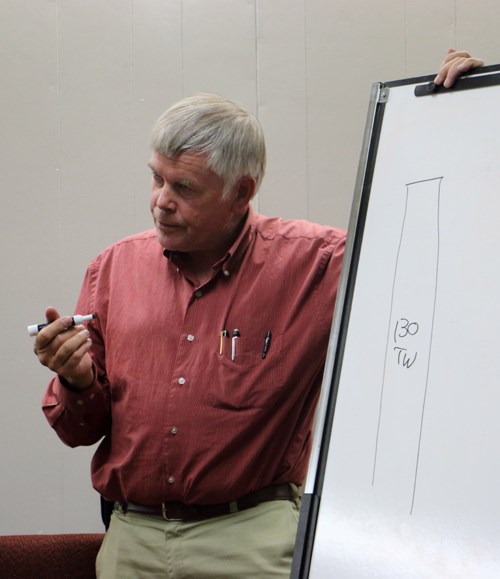Climate change is one of the major concerns of the 21st century, but local farmers accompanied by the Soil Carbon Coalition are working together to put carbon back into the ground and reduce carbon dioxide in the atmosphere.
The ranchers came together on Tuesday, Oct. 21, in Redvers to discuss and learn more about holistic management on their farms as well as the carbon cycle.
Peter Donovan, with the Soil Carbon Coalition, stated the carbon cycle was the "most powerful planetary force," explaining it is driven by solar energy.
Ultimately promoting healthy foliage will result in a healthy carbon cycle, thus holistic planned grazing is being researched for the amount of carbon it can put back into the soil.
The focus of the carbon cycle in holistic management is to improve soil health as organic carbon is necessary through photosynthesis to ensure healthy soil. Ultimately plants eat sunlight and use carbon dioxide and water to create carbohydrates respiring carbon back into the ground.
Encouraging the restoration of grasslands provides potential to deplete carbon dioxide in the atmosphere, a result from soil loss due to anthropogenic agricultural practices and industrial-era green house-causing emissions.
The Soil Carbon Coalition promote ranchers working with the process of photosynthesis and the carbon cycle in how carbon matter decays into the soil, helping create soil aggregate.
They have issued a Soil Carbon Challenge looking to create baseline plots across North America in order to measure soil carbon and to prove that holistic management is a way to help mitigate climate change.
Donovan explained that if the world stopped using fossil fuels it would take over a century for the world to work through the carbon cycle and deplete carbon dioxide in the atmosphere. With help through encouraging photosynthesis, Donovan says it is possible to calm the climate change conundrum.
Donovan's talk did not only touch on the importance of improving soil, but how one individual can make a change and influence others to do the same; inspiring and encouraging the local ranchers to record and share their findings with others of how holistic management is beneficial.
One of the main points Donovan made was of the carbon cycle being interconnected with all other cycles. He explained people break down problems into smaller segments as a way to overcome them, but when it comes to climate change, all aspects which feed into it need to be addressed together.
Interest in what Donovan was saying was taken in by over 20 people coming from over two-hours away to learn more about the importance of increasing carbon in the soil.
"Tonight really encouraged me..." Blaine Hjertaas, a rancher from the area who is awaiting his readings of carbon in the soil to see if his holistic management has seen a positive increase.
"One of our allies is that people are waking up and realizing that human health and soil health are the same thing. That connection gets more solid in the eyes of the consumer who is eating the food we produce they're going to be saying, 'What are you guys doing putting all that poison and chemicals into our food on the soil?' I'm not against technology in any way and I'm not an organic farmer in any way, but I think we need to think about the inputs we use affect what it does. If it makes it better then I'm all for it, if it's making the biology better then it's fantastic technology; but, if it's making it worse then I'm not so sure we should be so gung ho about it."
"I think consumers will likely be dictating to us what we'll be doing in the future, so I'm really excited about this."



